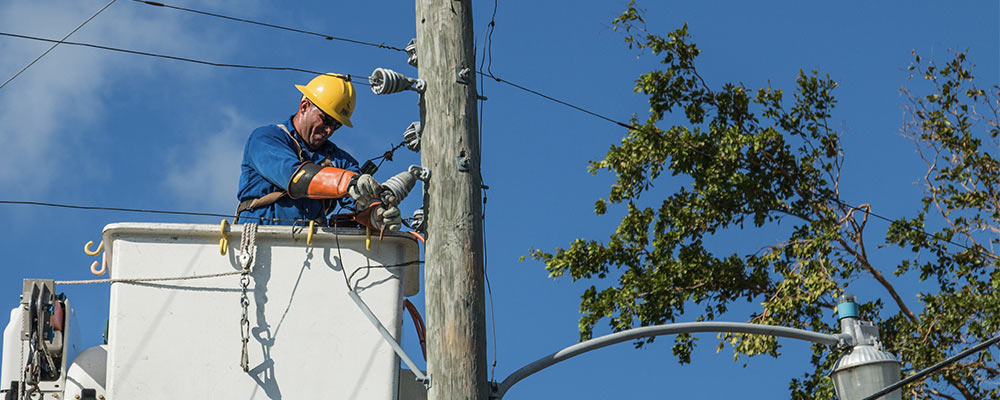TWS is a Great Training Option for Everyone
Learn more about how we can prepare you to advance your career.
Are you intrigued by electricity? Want to start a rewarding career as an electrical lineworker or electrician? Before you decide, it is essential to understand the difference between the two programs. The curriculum of each program is unique to the job that you will apply your abilities to. Make the right decision, and let Tulsa Welding School (TWS) help.
What Do You Learn During an Electrical Lineworker Program?
The curriculum is consistent with the national standards for the electric power generation, distribution, and transmission industry as described in the US Department of Labor Occupational Safety and Health Administration1. The course that makes up the Electrical Lineworker program curriculum include:
- OSHA and Compliance Training
- Job Briefs and Leadership Training
- Pole Climbing School
- General Pole Line Construction
- Field Equipment, Tools, and Materials
- Introduction to Transformers and Grounding
What Do You Learn During an Electrical Technologies Program?
The Electrical Technologies program consists of courses that will prepare you for concepts you’ll need to understand while working in the industry. The courses that make up the Electrical Technologies program curriculum include:
- Fundamentals of Electricity
- Fundamentals of Solar
- Electrical Wiring – Residential and Commercial
- Emerging Electrical Applications
- Motors, Lighting & PLC
- Electrical Distribution Systems
What is the Difference Between an Electrical Lineworker and an Electrical Technologies Program?
Have You Considered a Career in the Skilled Trades?
Fill out the form to recieve a no obligation info packet.
There are many differences between these two programs offered at Tulsa Welding School. The differences include:
Program Duration
The Electrical Lineworker program can be completed in as little as 15 weeks. The Electrical Technologies program can be completed in as little as 7 months. Both programs offer an extensive curriculum and plenty of hands-on experience and prepare graduates for entry-level positions in utilities and electrical applications.
Industry Role
The electrical lineworker focuses on the power line infrastructure that moves electricity through the wires that we see alongside roads. Electricians concentrate on the inner workings of homes and buildings and the wiring that keeps power flowing within the structure. Therefore, both roles are integral in powering our houses and buildings. The electrical lineworker gets the electricity to the home, and the electrician allows the electricity to flow through the home’s walls, powering our lights and appliances.

New: Industrial Maintenance
Learn About Our New Advanced Industrial Maintenance Program
Tulsa Welding School is proud to announce our newest program offering available at our Houston & Dallas Metro Campuses – Advanced Industrial Maintenance Technology! Learn the skills you need to take on the industries of manufacturing, distribution, energy production and facility maintenance in as few as 7 months.
Risk Tolerance
The Electrical Lineworkers and Electrical Technologies programs offer essential safety and compliance training to keep everyone safe and lower the risk to the trade professional. However, electrical lineworkers have the added danger of climbing electrical poles and using utility buckets to reach extreme heights to install and repair electrical lines. An electrical lineworker must have a more considerable risk tolerance and a more meticulous ability to keep themselves safe. Many certifications and guidelines, like the OHSA 10 card and the National Electrical Code2, help keep lineworkers and electricians safe while performing their jobs.
Want to Learn More?
Electrical Technologies Program
This 7-month Electrical Technologies program, available only at our Dallas Metro campus, will prepare you for an entry-level or trainee position as an electrician in the residential, commercial, and industrial industries.
Electrical Lineworker Program
Because becoming a lineworker is a hands-on job, technical training is typically required for anyone to enter this field. Many people invest in a trade program to learn the trade skills they need to be safe and effective as a professional. Students will have the opportunity to qualify for OSHA-10 certification upon successful completion of this program and receive a Diploma.
To learn more about our Electrical Lineworker program and Electrical Technologies program at the Dallas Metro campus, contact us at Tulsa Welding School or call (214) 227-9911.







